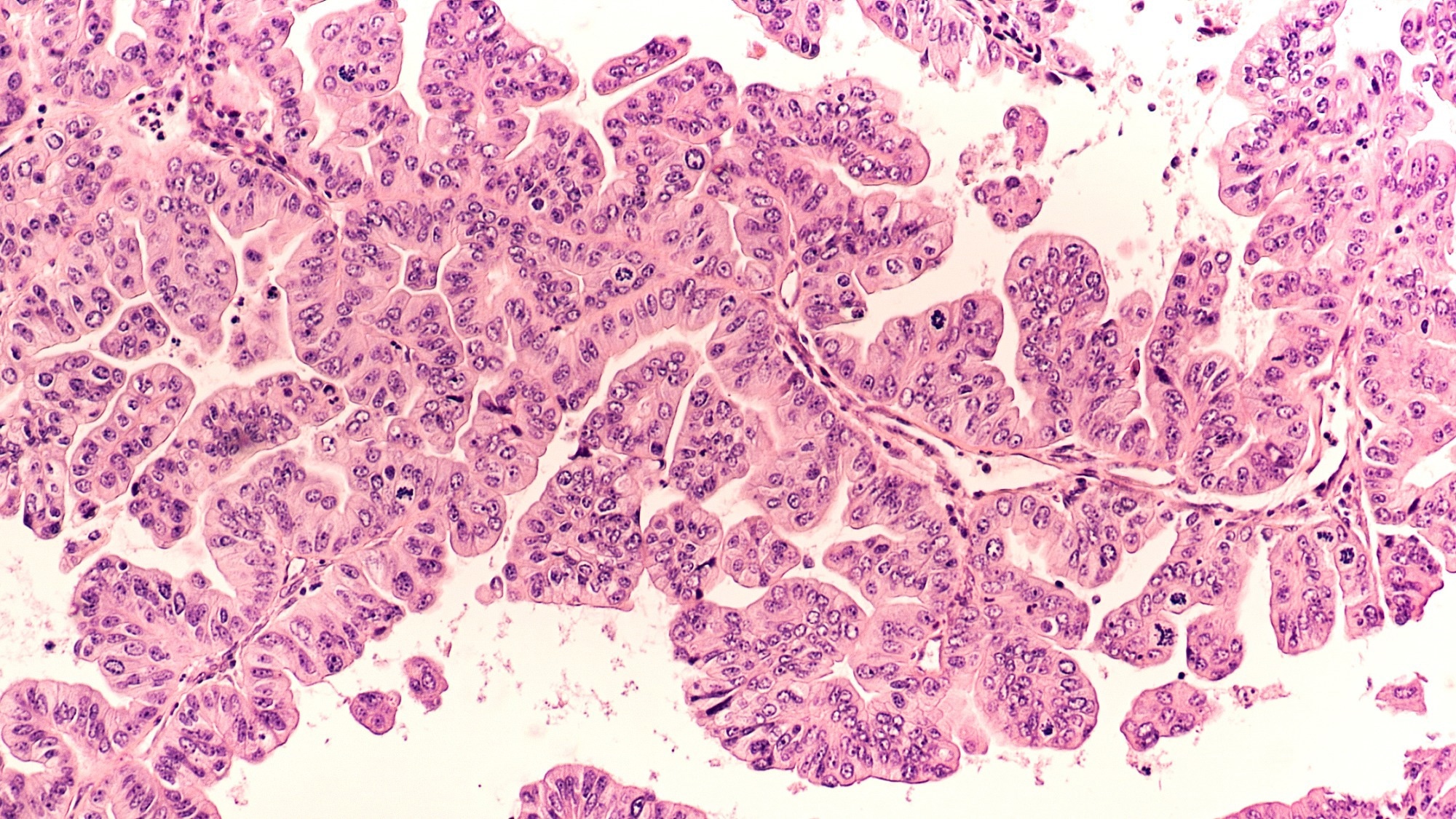.jpg) By Dr. Chinta SidharthanReviewed by Lexie CornerDec 18 2024
By Dr. Chinta SidharthanReviewed by Lexie CornerDec 18 2024Cell competition is a biological process in which cells assess their relative fitness levels through molecular interactions. This leads to the elimination of less fit neighbors, a mechanism that plays an important role in cancer progression. In ovarian cancer, tumor cells exploit this mechanism to gain a survival advantage.

Image Credit: David A Litman/Shutterstock.com
A recent study published in Nature Biotechnology investigated how cancer cells achieve this by inducing specific isoforms of the Flower protein through a long non-coding RNA (lncRNA).
The study revealed a mechanism by which this RNA alters gene splicing in surrounding cells, promoting tumor growth and metastasis, and identified a potential therapeutic strategy targeting the Flower protein.
Background
Cell competition phenomenon is mediated by "fitness fingerprints," such as Flower proteins, which exist in "Win" or "Lose" isoforms. In both fruit flies and humans, cells expressing the Lose isoform are eliminated when in proximity to cells with the Win isoform.
Tumor cells hijack this mechanism by inducing Lose isoforms in surrounding microenvironment cells, allowing the cancer to thrive. While the role of Flower proteins in cell competition has been well-studied, the mechanisms underlying tumor-induced changes in surrounding tissues are less understood.
Study overview
The study used molecular, cellular, and animal models to investigate how ovarian cancer cells manipulate neighboring stromal cells by altering Flower protein isoforms. The focus was on the induction of Lose isoforms in stromal cells and the mechanisms underlying this process.
Tissue samples from ovarian cancer patients were analyzed to identify epigenetic changes at the Flower gene locus. Methylation-specific polymerase chain reaction (PCR) and chromatin immunoprecipitation (ChIP) assays revealed epigenetic modifications that regulate the expression of Flower isoforms.
Further analysis identified a long non-coding RNA, Tu-Stroma, secreted by tumor cells through exosomes. Exosome isolation and RNA sequencing were used to confirm the role of Tu-Stroma in mediating the reprogramming of stromal cells by cancer cells.
To test potential therapeutic strategies, the researchers developed a humanized monoclonal antibody targeting Flower proteins. Its efficacy was evaluated using patient-derived xenograft models and three-dimensional (3D) cultures. The antibody was also tested in combination with standard chemotherapies to assess its impact on disease progression and possible synergistic effects.
The study utilized molecular biology tools and patient-derived experimental systems to analyze the interaction between tumor cells and their microenvironment, while also exploring therapeutic interventions targeting these processes.
Major findings
The researchers observed that ovarian cancer cells actively manipulate their surrounding microenvironment to enhance tumor growth and metastasis. The study found that cancer cells secrete Tu-Stroma, a long non-coding RNA, through exosomes, which induces the expression of the Lose isoforms of Flower proteins in stromal cells. This manipulation reduces the fitness of these neighboring cells, enabling tumor cells to dominate.
Additionally, the epigenetic analyses revealed that Tu-Stroma binds to exon 3 of the Flower gene in stromal cells, triggering DNA methylation and promoting alternative splicing, which generates Lose isoforms. This splicing event was confirmed to depend on specific epigenetic markers and binding proteins such as Serine/arginine-rich splicing factor 3 (SRSF3).
The inhibition of Tu-Stroma production or its transport disrupted the generation of these isoforms, suggesting a targeted mechanism by which cancer cells influence their microenvironment. Therapeutic experiments also demonstrated the efficacy of targeting the Flower protein using a humanized monoclonal antibody. This intervention reduced tumor size and metastasis in preclinical models, both as a standalone therapy and in combination with chemotherapy.
In patient-derived xenografts and 3D culture systems, the antibody effectively blocked the interaction between tumor and microenvironment cells, improving survival and reducing metastatic lesions. Additional analysis showed that the antibody treatment prevented the loss of stromal cell fitness, thus counteracting the competitive advantage of cancer cells.
Conclusions
This study highlights the role of cell competition in ovarian cancer progression and provides detailed insights into how tumor cells manipulate their microenvironment through Tu-Stroma and Flower protein isoforms.
By targeting this pathway with a monoclonal antibody, the research demonstrated a promising therapeutic strategy to disrupt tumor-microenvironment interactions and improve treatment outcomes in ovarian cancer.
These findings open new avenues for developing innovative therapies aimed at altering the tumor ecosystem to hinder cancer progression.
Journal reference
Madan, E., Palma, A. M., Vudatha, V., Kumar, A., Bhoopathi, P., Wilhelm, J., Bernas, T., Martin, P. C., Bilolikar, G., Gogna, A., Peixoto, M. L., Dreier, I., Araujo, T. F., Garre, E., Gustafsson, A., Dorayappan, Kalpana Deepa Priya, Mamidi, N., Sun, Z., Yekelchyk, M., Accardi, D. (2024). Ovarian tumor cells gain competitive advantage by actively reducing the cellular fitness of microenvironment cells. Nature Biotechnology. DOI:10.1038/s41587024024533 https://www.nature.com/articles/s41587-024-02453-3